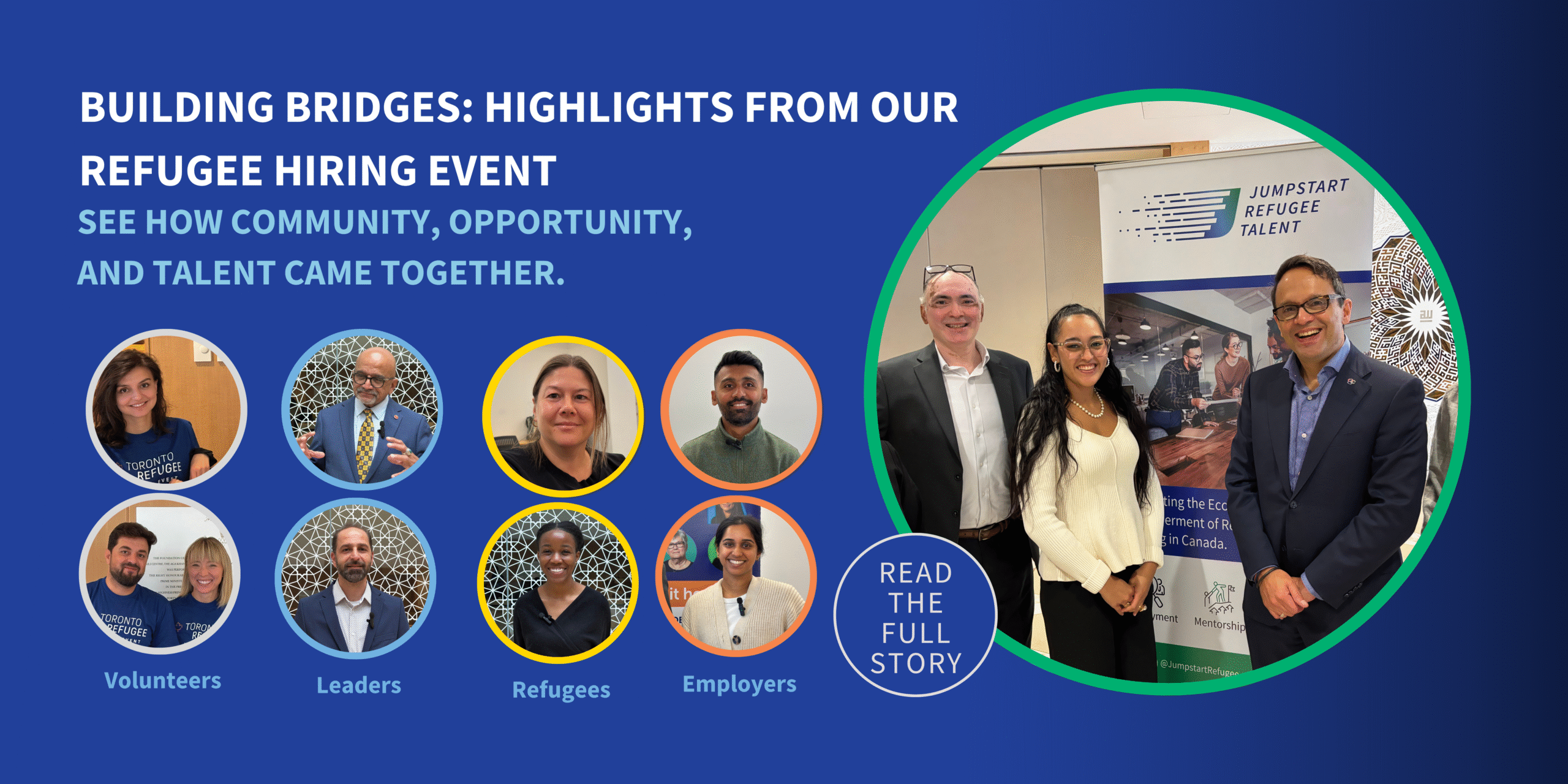Ask Me Anything: AI and the Future of Work
On September 3, 2025, Jumpstart Refugee Talent hosted an informative virtual Ask Me Anything (AMA) session titled “AI and the Future of Work: Unlocking New Job Opportunities.” The webinar was designed to support newcomer refugees curious about how artificial intelligence (AI) is affecting the Canadian job market — and how to use AI as a smart tool in the job search process.
Guest Speakers
We welcomed two inspiring speakers from Kibbi Technology:
- Denis Gravelle — Co-Founder of Devant and Chief Strategist at Kibbi. An educator and innovator, Denis is dedicated to shaping the future of work through workforce initiatives for newcomers and international students.

Co-Founder of Devant & Chief Strategist at Kibbi
- Han Tran — A Newcomer Services Leader with 20+ years of experience. Han has led government-funded projects and workforce strategies that strengthen settlement and employment outcomes for newcomers.

Newcomer Services Leader
Together, they shared practical demonstrations and answered four key questions on many refugees’ minds:
- How important are AI skills, and how do employers value them?
- What exactly counts as an AI skill?
- What is prompt engineering, and how can you get accurate responses from AI?
- What are the risks of using AI?
AI Skills
The webinar opened with a strong message: “It’s not AI that will take your job — it’s people who know how to use AI who will.”.
Denis and Han explained how Canadian businesses are rapidly adopting AI. While only 12% of companies currently use AI, that number has already doubled compared to last year. This momentum signals a clear trend: AI literacy is becoming essential in the workplace.
Employers are increasingly seeking candidates who not only bring expertise in their field but also possess basic AI fluency. As Denis noted: “Leaders would rather hire someone with less industry experience but stronger AI skills, because they can train the rest on efficiency.”
Han emphasized that AI tools aren’t just for the workplace — they can also support job seekers. Today’s tools can assist with mock interviews, resumes, cover letters, and even industry research.
However, both speakers issued a caution: a Forbes report shows that 80% of hiring managers discard applications that appear AI-generated, and more than half are less likely to consider candidates who rely too heavily on AI. Denis summarized it well: “Employers don’t want something generic or repetitive. They want the human touch. So remember to humanize the AI outcome.”
What Counts as an AI Skill?
Contrary to the common belief that AI skills mean coding, Denis and Han defined them more broadly as the ability to:
- Use AI tools strategically.
- Boost efficiency.
- Adapt to industries being reshaped by AI.
- Live Demonstrations
- Han Tran showcased Google AI Studio by simulating a newcomer practicing English with AI. The tool corrected errors in real time, showing how refugees can use AI to strengthen conversational skills, refine writing, and improve professional communication.
- Denis Gravelle demonstrated NotebookLM, which streamlines research by quickly compiling company data. This tool helps job seekers prepare for interviews more efficiently by providing key insights without hours of manual research.
- Denis also explained that AI skills include the ability to adapt. For example, with search engines shifting toward “answer engines,” industries like marketing must rethink strategies as fewer users click through websites. Understanding how AI platforms reshape visibility and customer behavior is now part of being job-ready.
Prompt Engineering
Denis introduced prompt engineering as “the science of crafting effective input prompts to get the most accurate, creative, or useful responses from AI.” He likened AI to a “super-smart two-year-old” — full of potential, but only if given clear, structured direction.
Strong prompts include:
- Persona: Frame AI as a colleague, expert, or advisor.
- Context: Provide background so responses are tailored.
- Clarity: Break prompts into smaller steps.
- Formatting instructions: Guide the output structure (e.g., “Give me 5 bullet-point ideas”).
- He demonstrated how adding persona and context (e.g., “Act as a marketing specialist and draft a professional but friendly email”) produces tailored results. His advice: the better your prompt, the better your outcome.
Risks of Using AI
Denis cautioned participants about AI’s risks and limitations:
- Accuracy: AI outputs can contain factual errors or biases.
- Lack of nuance: AI lacks human judgment and emotional intelligence.
- Data privacy: Unless settings are changed, information entered into AI tools may be stored and used for training, creating potential confidentiality risks.
- He concluded with a balanced view: the future lies in AI plus Human Intelligence — combining automation with critical thinking, creativity, problem-solving, and empathy. “It’s not AI versus humans — it’s AI plus human intellect.”
Key Takeaways
- AI skills are in demand: Employers expect at least basic AI literacy.
- Humanize outputs: Use AI for support, but add your personal voice and authenticity.
- Practical tools: AI can boost efficiency, support research, and act as a language partner.
- Prompt engineering matters: Strong prompts unlock AI’s potential.
- Be cautious: Watch for inaccuracies, biases, and data privacy risks.
- AI + Human Intelligence wins: People who combine critical thinking with AI tools will thrive.
Learn More
- Explore AI tools and resources at: https://mykibbi.ca/home
- If you’re exploring career options, building your profile, or planning your next steps in Canada, book a free one-on-one meeting with Jumpstart: https://jumpstartrefugee.ca/refugees/
Prompt Engineering
To better understand AI, Denis dove into the concept of prompt engineering, describing it as “the science of crafting effective input prompts to get the most accurate, creative, or useful responses from an AI system.” He offered a memorable analogy: working with AI is like working with a “super-smart two-year-old”, it has incredible potential, but only if given clear and structured directions.
Denis broke down the elements of a strong prompt:
- Persona: framing the AI as a colleague, expert, or advisor (“Act as a marketing specialist…”).
- Context: providing background so the AI tailors its response.
- Clarity: avoiding overloaded prompts and instead refining step by step.
- Formatting instructions: guiding the structure of the output (e.g., “Give me 5 bullet-point ideas”).
He demonstrated how adding a persona, such as “Act as a colleague and draft a professional but friendly email,” transforms the AI’s response from generic text into something far more tailored. “The better your prompt, the better your results,” Denis explained, urging participants to explore online courses to strengthen this emerging skill.
Risks and Considerations of Using AI
In the session, Denis also addressed the risks and limitations of AI. He cautioned that while AI is powerful, it is not infallible. He reminded the participants that AI outputs may contain factual errors, biases, or lack the nuance that comes with human judgment and emotion.
Another key issue he raised was data privacy. Unless users change their settings, the information they feed into AI systems may be stored and used for further training. This means that sensitive data could inadvertently become part of the model’s knowledge base. Denis encouraged the participants to be mindful of what they share and to explore privacy options within the tools they use.
Despite these risks, Denis concluded on a note of balance. He introduced the idea of AI plus Human Intelligence: the combination of automation with uniquely human strengths such as critical thinking, problem-solving, creativity, and curiosity. “It’s not AI versus humans—it’s AI plus human intellect,” he summarized. This, he suggested, is the path forward for individuals and organizations alike.
Key Takeaways
- AI skills are in demand: Employers increasingly expect candidates to have at least basic AI literacy.
- Humanize AI outputs: While AI can support resumes, cover letters, and interview prep, hiring managers quickly spot generic AI writing. Authenticity and a personal touch remain critical.
- AI tools using: Effective use of AI tools can enhance efficiency, research, and communication. AI can even act as a language partner, correcting grammar and refining English skills in real time.
- Prompt engineering: crafting clear, contextual prompts helps unlock AI’s potential.
- Be mindful of risks: AI can be inaccurate, biased, and lack emotional intelligence. Data privacy is another concern, as user inputs may be stored for model training.
- AI + Human Intelligence: AI will not replace humans, but people who can combine critical thinking, creativity, and judgment with AI tools will thrive.
If you want to learn more about how AI tools or skills can help you through job searching visit: https://mykibbi.ca/home
If you are exploring career options, building your professional profile or network, or planning your next step in Canada, book a free one-on-one meeting at Jumpstart can help you find unique solution in your specific field: https://jumpstartrefugee.ca/refugees/






